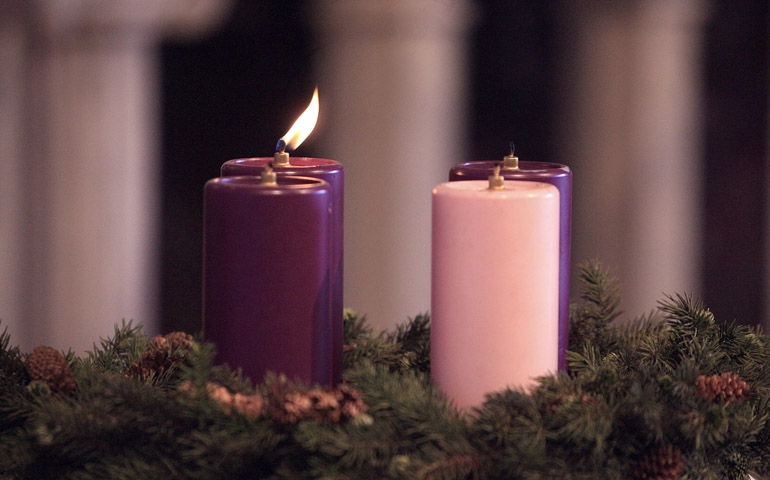Mara just, by requirement of the Diocese of Madison for all her age in Catholic schools in the diocese, had an examination on the Ten Commandments. Kelly & I tutored. She got a perfect score. There are standards in this household. There are standards.
-by Noble Kuriakose, Pew Research Center
“Priests and ministers have long noted a sharp increase in church attendance around the two most significant Christian holidays, Christmas and Easter. Some have given those who attend services only at those times of year a name — “Chreasters” — and churches have launched campaigns to get them to attend more regularly.
Google searches for “church” spike during Easter and Christmas seasons. More Americans search for “church” around Easter than at any other time, with the Christmas season usually ranking second, according to Google Trends data between 2004 and 2013. Google’s Trends tool measures the popularity of a search term relative to all searches in the United States. Data are reported on a scale from 0 to 100.
Easter is Christianity’s oldest and most important holiday, during which Christians celebrate Jesus’ Resurrection three days after he was crucified. In liturgical terms, Easter Sunday is a moveable feast. Its observance, which comes at the end of a 40-day period of penance, fasting and self-examination called Lent, changes within a range of time each spring. Between 2004 and 2013, Easter was in March three times and April seven times.
In 2013, the highest share of searches for “church” are on the week of Easter Sunday, followed by the week of Christmas and the week of Ash Wednesday, the day that marks the beginning of Lent; Mother’s Day is next, and Father’s Day is near the bottom.
The lowest share of searches occur on the week of Thanksgiving in November each year, and the summer months have consistently low levels of interest in web searches for “church.” Sociologists also have previously reported low levels of church attendance during the summer months. Laurence Iannaccone and Sean Everton analyzed weekly attendance records from churches and argued that people are less likely to attend church when the weather outside is just right in a journal article titled “Never on Sunny Days.”
The Precepts of the Church – Catechism of the Catholic Church
Before going further, it is important to note what the Catechism of the Catholic Church tells us about Catholic Mass attendance.
The first precept (“You shall attend Mass on Sundays and holy days of obligation and rest from servile labor”) requires the faithful to sanctify the day commemorating the Resurrection of the Lord as well as the principal liturgical feasts honoring the Mysteries of the Lord, the Blessed Virgin Mary, and the saints; in the first place, by participating in the Eucharistic celebration, in which the Christian community is gathered, and by resting from those works and activities which could impede such a sanctification of these days.
The second precept (“You shall confess your sins at least once a year”) ensures preparation for the Eucharist by the reception of the sacrament of reconciliation, which continues Baptism’s work of conversion and forgiveness.
The third precept (“You shall receive the sacrament of the Eucharist at least during the Easter season”) guarantees as a minimum the reception of the Lord’s Body and Blood in connection with the Paschal feasts, the origin and center of the Christian liturgy. (CCC 2042)
The precept of the Church specifies the law of the Lord more precisely: “On Sundays and other holy days of obligation the faithful are bound to participate in the Mass.” “The precept of participating in the Mass is satisfied by assistance at a Mass which is celebrated anywhere in a Catholic rite either on the holy day or on the evening of the preceding day.”
The Sunday Eucharist is the foundation and confirmation of all Christian practice. For this reason the faithful are obliged to participate in the Eucharist on days of obligation, unless excused for a serious reason (for example, illness, the care of infants) or dispensed by their own pastor. Those who deliberately fail in this obligation commit a grave sin. (CCC. 2180 and 2181)
The Code of Canon Law, the legal code of Christ’s Church, states:
On Sundays and other holy days of obligation, the faithful are obliged to assist at Mass. They are also to abstain from such work or business that would inhibit the worship to be given to God, the joy proper to the Lord’s Day, or the due relaxation of mind and body.
The obligation of assisting at Mass is satisfied wherever Mass is celebrated in a Catholic rite either on a holy day itself or on the evening of the previous day. (Can 1247, 1248)
Both the code of Canon Law and the Catechism clearly state the obligation. There was some general teaching prior to Vatican II that one had to be present for the offertory through reception of Holy Communion to fulfill the obligation. However this is not a part of the canon and the faithful are to participate in the complete Mass in order to fulfill the Sunday obligation.
Praying for strength for you & I, when we least feel like going to Mass. It happens. Offer it up, as we work out our salvation in fear and trembling. (Phil 2:12)
Love,
Matthew











